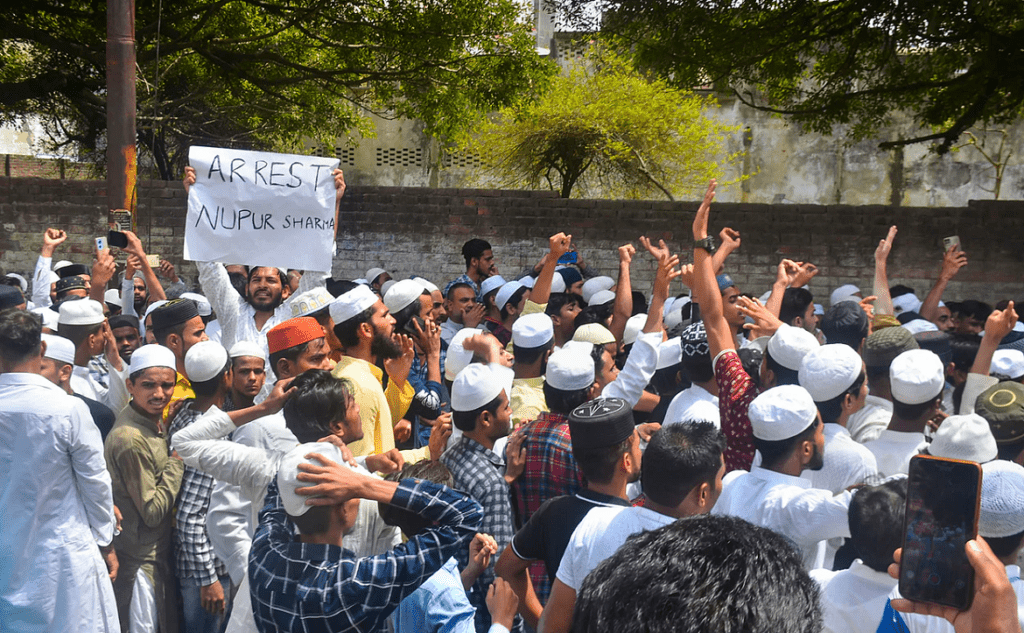By Naeem Barrech
The conventional wisdom yet exists that the integration of the Muslim Bloc is out of the question, and its credibility to work as a whole is just a myth at a time when the complex interdependence and the spirit of nationalism are incompatible with this utopianism.

But the recent memories bear testimony otherwise. In May, the spokesperson of the Bharatiya Janta Party Napur Sharma was found remarking hate speech against the Prophet Muhammad in her interviews not once but thrice. This opened a united front of Arab countries against New Delhi.
Sixteen countries stated against India. The Organization of Islamic Cooperation, Saudi Arabia and the UAE issued a condemnation. In Qatar, Iran, and Kuwait the Indian ambassadors were summoned. Indian products were boycotted in Kuwait. Within a day, the Indian government suspended Sharma and described her “fringe element”.
The Narendra Modi Administration had several reasons to do so. Firstly, New Delhi imports 60 percent of its oil from the Middle East. Secondly, there are 9 million Indian Diasporas in the region who send $40 billion in remittances annually which contributes 3 percent to the country’s GDP.
Thirdly, Qatar is India’s leading supplier of natural gas. Fourthly, bilateral trade between India and GCC is recorded as $154 billion in 2021-2022. Fifthly, the primary concern of New Delhi is to counter the Pakistani pressure over Kashmir that is exercised through the Muslim Bloc. Finally, an Indo-Arab split would make way for China which can cause vulnerability to India in the Sea Lines of Communication and chokepoints.
This development in global politics has deconstructed prevailing wisdom and unpacked several dimensions. Initially, the complex interdependence was thought to be a limitation for the Muslim world to go together since every state has its respective national interests beyond any collective. Today, the atypical approach by the Muslim world notably the Arabs has proved that the complex interdependence is a tool that the united front can use to demand actions from any country.
Secondly, since the initial impetus has been laid down, a Muslim front, alike, can be brought forth against Israel over the Palestinian question and India on its atrocities and human rights violations in Kashmir. It can be further extended against China due to its repression in Xinjiang against the Uyghur Muslims. More importantly, it can also be used to counter Islamophobia in the West.
Thirdly, in sharp contrast to the conventional wisdom, the Muslim front can be sustainable and durable. The global issues of Muslims if actively incorporated into the bloc’s objectives, the demand for crude oil and its transport through chokepoints and the shift in the global distribution of power from a unipolar world to a multi-polar world can incentivize the durability and the sustainability of the united front.
Fourthly, it is also unpacked that for every Muslim endeavor the presence of the United States is not mandatory. The security umbrella of the US has always worked as a balancer. Be it Saddam Hussian’s aggression, civil wars, the Iranian quest for nuclear technology, and the maintenance of the Arab-Israel relations. It increased the dependency of Muslims on Washington.
Interestingly, the US is no more reliable due to two reasons: Washington’s unilateral withdrawal from the Middle East in the wake of the unprecedented rise of China, and the American strategic ambiguity towards Ukraine in Eastern Europe.
It wouldn’t be illogical and idealistic to think of a united front in this scenario. The regional politics of the Middle East in specific is constantly changing. For instance, the recent truce between Houthis and Riyadh, the series of bilateral talks between Iran and Saudi Arabia mediated by the Iraqi government and the direct re engagement of the UAE with Iran; Ankara hosting MBS, Syrian president’s first tour to Arab countries since the inception of the civil war are alive instances.
These developments cannot establish that peace is in hand and collectives will perform effectively. These developments along with Napur Sharma’s remarks, which are a triggering event, can push an effective collective of the Muslim world. If an attack by Israel to Al Aqsa Mosque can lay the initial impetus of the Organization of Islamic Corporation, the hate speech of Nupur Sharma can also lead to rapprochement and structural incentives for stability and collective action in the Muslim world.
Finally, to achieve this end, the united front should initiate frequent and rapid diplomatic missions. They must support the fragile economies and should take the leverage of the changing world order caused by the Russian invasion of Ukraine. It is, undoubtedly, the time to readdress their approaches in the changing dimensions.
Naeem Barrech is a graduate of Global Politics and History from Balochistan. He is an executive member of the Human Rights Council of Pakistan (Balochistan Chapter) and writes on several platforms nationally and internationally.
(The opinions expressed in this article are solely those of the author and do not necessarily reflect the views of World Geostrategic Insights)
Image credit: PTI Photo







